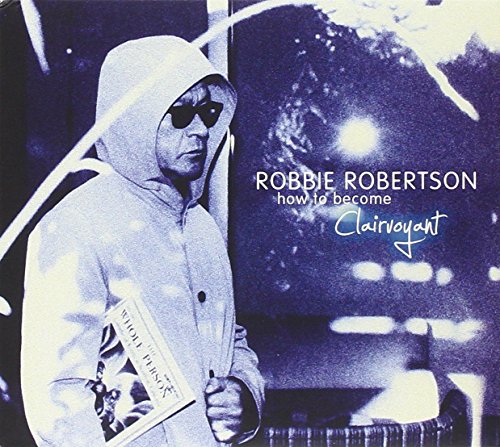
Robbie Robertson
How to Become Clairvoyant
Release Date: Apr 5, 2011
Genre(s): Pop/Rock, American Trad Rock
Record label: 429 Records
Music Critic Score
How the Music Critic Score works
Buy How to Become Clairvoyant from Amazon
Album Review: How to Become Clairvoyant by Robbie Robertson
Very Good, Based on 8 Critics
Based on rating 5/5
"Some things got tradition/Some shine like new," Robbie Robertson sings in his limited but oddly affecting growl in the first song here, "Straight Down the Line. " It is an apt description of the distinguishing tangle in his work — the antique and the immediate, from the Vietnam-era resonance of his Civil War parables for the Band to the haunted atmospheres and slow-drag love songs on this album. How to Become Clairvoyant is Robertson's first record in more than a decade and a return to the ambitious aural cinema and textural explorations of 1987's Robbie Robertson and 1991's Storyville.
Based on rating B
Robertson’s first solo album in more than 10 years is down-the-middle slickness ‘n’ cynicism: Steely Dan meets Warren Zevon in limbo. Romanticizing himself as a guitar-slinging ”Axman,” Robertson unloads on The Band on ”This Is Where I Get Off” and indulges in a Django Reinhardt salute. At his best, How to Become Clairvoyant makes convincing cases for the power of middle-aged experience and corrosive honesty (”The Right Mistake”).
Based on rating 6.5/10
An old master modestly hides the kitchen sink Robbie Robertson’s first solo effort in 10 years doesn’t sound like it’s stacked with the likes of Trent Reznor and Tom Morello alongside less shocking cameos from Clapton, Winwood, Robert Randolph and others. On one level, his legion of admirers will appreciate the restraint — there are no campy covers with let’s-take-turns guitar solos, no forced genre exercises, no bizarre musical stray dogs in a vain attempt to modernize. Still, Clairvoyant feels a bit underpowered when you consider the sheer tonnage of talent surrounding it.
Based on rating 6/10
It took 11 years for Robbie Robertson to make his mark as a solo artist after the Band disbanded. “I wasn’t so sure I had something to say,” was his excuse. Was he genuinely modest or just underselling himself to be on the safe side? The 13-year wait for his fifth solo album, if anything, definitely puts him on the fussy side of the creative process these days.
Based on rating 6/10
How to Become Clairvoyant is Robbie Robertson's first album since 1998's Contact from the Underworld of Red Boy. In the interim, he served as musical director for some Martin Scorsese films, produced soundtracks, and worked as an A&R man for Dreamworks. Co-produced by Robertson and Marius de Vries, the 12-song set boasts an impressive guest list. Eric Clapton makes seven appearances on guitar, duets on "Fear of Falling," co-wrote three tunes, and contributed an instrumental ("Madame X," which is minimally but beautifully textured by Trent Reznor).
Opinion: Excellent
It’s worth mentioning that the 13 years separating this new Robbie Robertson effort from his previous one in 1998, is five years longer than the original lineup of the Band was even together. The guitarist/songwriter wasn’t on a total sabbatical during that time; he worked as musical director on some Martin Scorsese films, produced soundtracks for others, was employed by Dreamworks as an A&R executive and appeared sporadically as guest guitarist for other artists. Inspired by encouragement from friend Eric Clapton—who appears on seven tracks here and even sings one—Robertson recruited heavyweights such as Steve Winwood, bassist Pino Palladino and co-producer Marius de Vries to record twelve tracks that wade in soulful atmospheric moods and personal lyrical introspection on this generally inspired comeback.
Opinion: Very Good
There’s much to marvel at on Robertson’s first LP of the 21st century. David Sheppard 2011 Erstwhile leader of The Band, Jaime Royal ‘Robbie’ Robertson has enjoyed a curiously disjointed solo career since taking leave of the influential Canadian quintet in 1976. A smattering of studio and film production work, a couple of soundtracks and four inconsistent solo albums have all failed to match the heights the 20-something Torontonian achieved in penning classics like The Weight or The Night They Drove Old Dixie Down.
Opinion: Very Good
Proper follow-up to the Band leader's unblemished solo start, 1987's Robbie Robertson and Storyville (1991), rides Eric Clapton uptown on seven tracks, 3am urban blues for the limousine set. Slowhand's whale tones on "He Don't Live Here No More" meet Robertson's gut-string pluck, while Steve Winwood's organ grounds "She's Not Mine" prior to the SRV clichés of "Axman." Even so, the Clairvoyant's long-simmered songcraft rarely tarnishes. .
'How to Become Clairvoyant'
is available now

